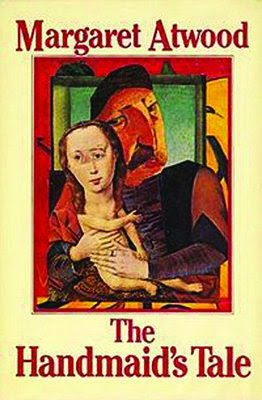I can't prove it, because after reading several interviews and descriptions, she hasn't told me, but I suspect Margaret Atwood followed a kind of intuitive approach in writing The Handmaid's Tale.
By intuitive, I mean that kind of writing in which you allow character, setting, dilemma, to lead the way, rather than a pre-arranged plot. You, the writer, don't know what's going to happen--or at least, not very clearly how you'll get there--when you sit down to write the first chapter. Some people call this the "pantser" (vs. "plotter") approach--writing by the seat of your pants. Bradbury put it like this: "Find out what your hero wants, then just follow him."
Here are my reasons for thinking Atwood tackled The Handmaid's Tale this way:
1. The scenery/environment is well developed, but the trajectory of the main character (Offred) is episodic for much of the book. It lacks a clearly defined "plot."
2. Offred is fully realized; her inner life is available to the reader--or at least as much as it is available to her. This is virtually impossible to achieve, as far as I can tell, in a highly plotted novel, for the simple reason that the characters become cogs in the machinery of plot. In such a novel, the complex, layered thoughts of a character tend to be more hindrance than help, since they'll often lead to unpredictable actions that derail the plot.
3. Atwood remarks that she knew where the story was going, so she didn't have to query herself about it; this suggests that she sometimes does have to query herself--meaning she doesn't plot out in advance. So did she this time? I doubt it. Knowing where the story is heading is a sign of a very realized sense of the character in relation to the situation in which she's been placed--her limitations, or parameters, within that situation, and within her particular personality.
This, in my view, would not mean there would be no persons, situations, or even characters arising in the unfolding of the story that the conscious mind has not planned in advance. For instance, when Atwood placed Offred in a relationship with a married man (in her past; "Luke"), did she foresee the tension this would create with Serena Joy, the wife of the Commander for whom she's a "handmaid"? Or did this rather come to her in the telling of the story, a "lucky happenstance," a chance encounter that presented another layer to the story? Because, to me at least, this element complicates a simple before=good/after=bad equation. And I find it convenient to suppose that Atwood's subconscious resisted that equation, more than (or as much as) her conscious mind.
But, of course, I'm only guessing. Call it intuition.
Well, I promised "thoughts" and really have only given you one. So let me add another, unrelated: Somehow it doesn't bother me that Atwood has distanced herself from sci-fi. In one article I found (in the Guardian), she admits to writing sci-fi, "or speculative fiction, if you prefer." A writer like her, working in "literary" fiction as well as speculative (or sci-fi), can be excused for wanting to distance herself from space octopi. Just saying.
If you've read the novel (or better yet, an interview or confession I couldn't find; or better still, you are Margaret Atwood) and you'd like to weigh in, I'm all ears.
Update: I overlooked an interview with Margaret Atwood in The Paris Review when I was writing this post. It turns out I was right. Here's what she says:
When I’m writing a novel, what comes first is an image, scene, or voice. Something fairly small. Sometimes that seed is contained in a poem I’ve already written. The structure or design gets worked out in the course of the writing. I couldn’t write the other way round, with structure first. It would be too much like paint-by-numbers. As for lines of descent—that is, poem leading to novel—I could point to a number of examples. In my second collection of poems, The Animals in That Country, there’s a poem called “Progressive Insanities of a Pioneer.” That led into the whole collection called The Journals of Susanna Moodie and that in turn led into Surfacing. Or, another line of descent, the poems in parts of True Stories have obvious affiliations with the novel Bodily Harm. It’s almost as if the poems open something, like opening a room or a box or a pathway. And then the novel can go in and see what else is in there. I’m not sure this is unique. I expect that many other ambidextrous writers have had the same experience.

